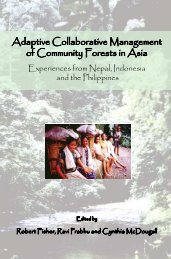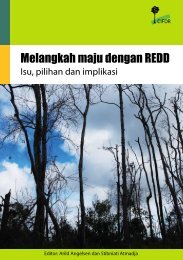Where the power lies: multiple stakeholder politics over natural ...
Where the power lies: multiple stakeholder politics over natural ...
Where the power lies: multiple stakeholder politics over natural ...
You also want an ePaper? Increase the reach of your titles
YUMPU automatically turns print PDFs into web optimized ePapers that Google loves.
Table 1.6 Participation in Mrembwe village by wealth and ethnicity<br />
Class % number Ethnicity<br />
of people<br />
in each<br />
Catagory<br />
Comments on participation in RMC<br />
1 (very rich ) 9 7 Shona, 8 Ndebele Immigrants. In general some of <strong>the</strong>se<br />
households migrants rarely participate in RMCs<br />
2 11 15 Ndebele, 3 Shona, Some members participate and occupy<br />
1 Tonga positions of authority on <strong>the</strong> RMCs<br />
3 31 20 Shona, 30 Ndebele, Very active in projects and RMCs<br />
2 Nyasaland<br />
(from Malawi),<br />
3 Shangwe<br />
4 17 2 Nyasaland, 3 Shona,<br />
21 Ndebele, 4 Tonga<br />
Less than half participate in <strong>the</strong> RMCs<br />
5 28 14 Shona, 5 Tonga, Some of <strong>the</strong> members of <strong>the</strong> group are<br />
1 Kalanga, 2 Shangwe, members of projects but do not hold<br />
1 Nyasaland. any positions<br />
6 (very poor) 4 1 Tonga, 1 Shona, Rarely attend meetings and are not<br />
4 Ndebele, members of any projects.<br />
1 Nyasaland One member is a committee member<br />
of <strong>the</strong> nursery group<br />
Early migrants are more accepted than recent migrants, whatever <strong>the</strong>ir ethnic group,<br />
and <strong>the</strong>y do sometimes get elected to higher positions. For example, <strong>the</strong> chairperson of<br />
<strong>the</strong> beekeeping group is a migrant. However, this individual is well connected both locally<br />
and outside <strong>the</strong> village.<br />
Canadian International Development Aid (CIDA)<br />
CIDA financed <strong>the</strong> project through <strong>the</strong> Forestry Commission’s community forestry division.<br />
Over <strong>the</strong> last ten years <strong>the</strong> financing of <strong>the</strong> CIDA has been relying primarily on review<br />
reports and consultants’ assessments of <strong>the</strong> collaborative project.<br />
Centre for International Forest Research (CIFOR)<br />
CIFOR is a relatively new player in Gokwe, having only started working <strong>the</strong>re in 1999.<br />
It may be premature to try and outline how CIFOR relates to <strong>the</strong> o<strong>the</strong>r organizations,<br />
as locally <strong>the</strong>ir interactions have been primarily consultative at district more than at<br />
<strong>the</strong> local level. At present, local attitudes towards CIFOR were limited to comments<br />
from participants of a district level workshop and from village people who attended<br />
CIFOR-initiated village meetings. CIFOR is working on a project to facilitate social<br />
learning to improve collaboration among <strong>stakeholder</strong>s involved in joint forest<br />
management.<br />
Rural District Council (RDC), Member of Parliament (MP) and <strong>the</strong> councillor<br />
The Rural District Council (RDC) is <strong>the</strong> local g<strong>over</strong>nment authority that derives its <strong>power</strong>s<br />
from <strong>the</strong> Rural District Councils Act of 1988. The RDC comprises a council of elected<br />
individuals and an executive controlled by <strong>the</strong> Chief Executive Officer. The councillor is<br />
an elected individual who is also Chairperson of a ward. A ward c<strong>over</strong>s an area of more<br />
than one Village Development Committee (VIDCO). A Member of Parliament (MP) is elected<br />
9

















